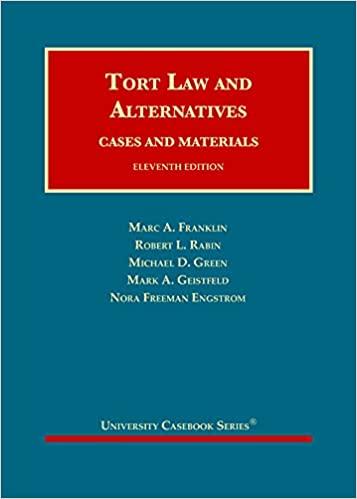Question
1. Maintaining trust between stakeholders and organizations is ________. A. the stakeholder's responsibility B. an ethical minimum C. an ethical maximum D. a social contract
1. Maintaining trust between stakeholders and organizations is ________.
A. the stakeholder's responsibility
B. an ethical minimum
C. an ethical maximum
D. a social contract
2. True or false? Companies are required to provide amenities to their employees to fulfill the social contract
between management and employees as stakeholders.
3. Choose your favorite brand. List at least five of its key stakeholder groups.
4. A shareholder is a stakeholder who ________.
A. holds stock for investment
B. has a general interest in the fate of all publicly traded companies
C. focuses on the means by which firms get their products to market
D. always purchases the product or service of a particular company
5. A stakeholder claim ________.
A. is usually a complaint
B. is always financial
C. is any matter of concern for the corporation or company
D. is the same as a lawsuit
6. Explain how the normative approach to stakeholder theory informs the instrumental aspect and the
descriptive approach.
7. What is the most important quadrant in the influence/interest matrix, and why?
8. In correct order, the stakeholder management steps adapted from the approach of the MITRE consulting
firm are to ________.
A. build trust, identify stakeholders, prioritize claims, visualize changes, and perform triage
B. build trust, identify stakeholders, gather and analyze data, present results, make changes, and prepare
a communication strategy
C. build trust, identify stakeholders, gather and analyze data, present findings to management, and
communicate key messages to stakeholders conveying the company's appreciation of them
D. identify stakeholders, gather and analyze data, make changes, and present results
9. True or false? Stakeholder management practice ultimately is about valuing stakeholder contributions to a
firm, no matter how significant, inspired, or influential that contribution might not be.
10. Name the three components of the triple bottom line.
11. What does the California Transparency in Supply Chains Act require of businesses that operate in
California?
12. True or false? Corporate social responsibility is a voluntary action for companies.
13. The Dow Jones Sustainability Indices provides information for ________.
A. investors who seek quick profit
B. investors who seek long-term returns
C. investors who value CSR in companies
D. marketing promotions of each of its members
Step by Step Solution
There are 3 Steps involved in it
Step: 1

Get Instant Access to Expert-Tailored Solutions
See step-by-step solutions with expert insights and AI powered tools for academic success
Step: 2

Step: 3

Ace Your Homework with AI
Get the answers you need in no time with our AI-driven, step-by-step assistance
Get Started


